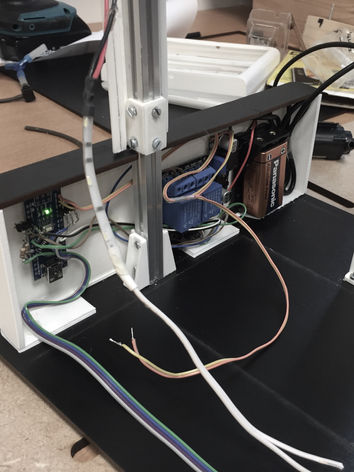
ModiGrow |
A modular aquaponic system designed for company canteens
2018.2- 2018.8 // Time
Master graduation project - TU Delft // Course
Solo design // Contributions
Riverfood // Collaboration company
Aquaponics is the combination of two existing techniques, hydroponics, and aquaculture. This symbiosis process of recycling wastes and recirculating water creates potentials for aquaponics in future vegetable and aquaculture produce.

show more
show less
ModiGrow is a solution with product and service proposed to implement aquaponics, a circular farming concept in a company setting.
This graduation project collaborates with a startup company, Riverfood, with the vision to make aquaponics accepted as a food production method for urban dwellers. A modular aquaponic system (80*80*200cm) that is adaptable to various indoor settings is designed, addressing the limitations in space and floor loading. The system is also op to be upgraded and with the optional educational module to advocate the circular concept about aquaponics.
(Due to the limited budget, a quarter-scale modular model was made using rapid prototyping methods.)
Background
Facing the challenge of feeding a growing city population in the future, our conventional food production methods, using soil-based techniques and industrialized practices, would not suffice the demand.
Aquaponics is believed to be a sustainable alternative for producing vegetables and fish together. Recirculating the water allows fish to produce waste which would later convert via microbes to nutrients that can be absorbed by plants.

The Challenge
The Challenge
There is not enough demands for aquaponics-related products or produce.
Hence there is a need to find a solution to honestly “advertise” aquaponics and its benefits to urban dwellers. This would kick start a virtuous cycle of market demands
for aquaponics.

Niche market
B2B Route
The decision is to design a showcasing system placed in company canteens in order to serve as a complimentary vegetable supplier, as well as an advertisement of aquaponics technique and circular farming.

Designs can be adapted from a standardized design based on the given restrictions.
The system will be regarded as a functional and a “educational” tool to
introduce aquaponics to wider audience.
The clients may request upgrades by adding operating units.
Concepts
The system should fulfill the listed design vision, which is a functional mini farm and a “decoration” that triggers conversations. The ‘Screen’ concept from the ideation phase was selected due to several features. It is important to intuitively showcase the water recirculation that facilitates aquaponics.

Detailing



Reflection & More
Like most (individual) graduation projects, this design journey has been a rewarding experience, but also a mental training of commitment.
The topic, aquaponics happened to correlate both keywords which strongly motivates me, food and sustainability. Besides two personal drivers, issues regarding sustainable agriculture are becoming more noticed with the rapidly growing population from now to 2050.
So I take the chance to collaborate with this startup, Riverfood , to exploit possibilities under this seemingly idealistic topic. The learning was non-stop. During that six months, I was often confronted with financial problems and was challenged to be a strategic thinker. Nevertheless, I wanted to experience the holistic process, and still ambitiously position this design to be a tangible asset as well as an intangible sign within the scope of urban farming.
Coaches: Henk Kuipers | chair, Frans Taminiau| mentor, Linda Grontenbreg | company
Relevant organizations: Riverfood, TU Delft, R2PRO

.png)








